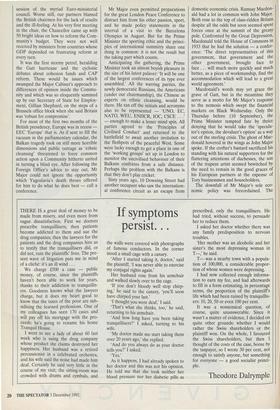If symptoms
persist. .
THERE IS a great deal of money to be made from misery, and even more from vague dissatisfaction. First we doctors prescribe tranquillisers; then patients become addicted to them and sue the drug companies; then the lawyers for the patients and the drug companies hire us to testify that the tranquillisers did, or did not, ruin the plaintiffs' lives. The pre- sent wave of litigation puts me in mind of a cliché: it's an ill wind. . .
We charge £500 a case — public money, of course, since the plaintiffs haven't been able to work for years, thanks to their addiction to tranquillis- ers. Goodness knows what the lawyers charge, but it does my heart good to know that the taxes of the poor are sub- sidising the learned professions. One of my colleagues has seen 170 cases and will pay off his mortgage with the pro- ceeds: he's going to rename his home Tranquil House.
I went to see a lady of about 60 last week who is suing the drug company whose product she claims destroyed her happiness. Her husband was a retired percussionist in a celebrated orchestra, and his wife said the noise had made him deaf. Certainly he said very little in the course of my visit; the sitting-room was crowded with drums and cymbals, and the walls were covered with photographs of famous conductors. In the corner stood a small cage with a canary. 'After I started taking it, doctor,' said the plaintiff, 'I was never able to exercise my conjugal rights again.' Her husband rose from his armchair and walked slowly over to the cage. 'If you don't bloody well stop chirp- ing,' he said to the canary, 'you'll soon have chirped your last.'
'I thought you were deaf,' I said. 'That's what she thinks, too,' he said, returning to his armchair.
'And how long have you been taking tranquillisers?' I asked, turning to his wife.
'My doctor made me start taking them over 20 years ago,' she replied.
'And do you always do as your doctor tells you?' I asked.
'Yes.'
As it happens, I had already spoken to her doctor and this was not his opinion. He told me that she took neither her blood pressure nor her diabetic pills as prescribed, only the tranquillisers. He had tried, without success, to persuade her to reduce them.
I asked her doctor whether there was any family predisposition to nervous troubles.
'Her mother was an alcoholic and her sister's the most depressing woman in T—,' he said.
T— was a nearby town with a popula- tion of 100,000, a considerable propor- tion of whose women were depressing.
I had now collected enough informa- tion to earn my fee, and had afterwards to fill in a form estimating, in percentage terms, the proportion of the plaintiffs life which had been ruined by tranquillis- ers: 10, 20, 50 or even 100 per cent.
It was a nonsensical question, of course, quite unanswerable. Since it wasn't a matter of evidence, I decided on quite other grounds: whether I would rather the Swiss shareholders or the plaintiff won. On the whole, I favoured the Swiss shareholders, but then I thought of the costs of the case, borne by the taxpayer, so I wrote 30 per cent, not enough to satisfy anyone, but something for everyone — a good socialist princi- ple.
Theodore Dalrymple










































































 Previous page
Previous page